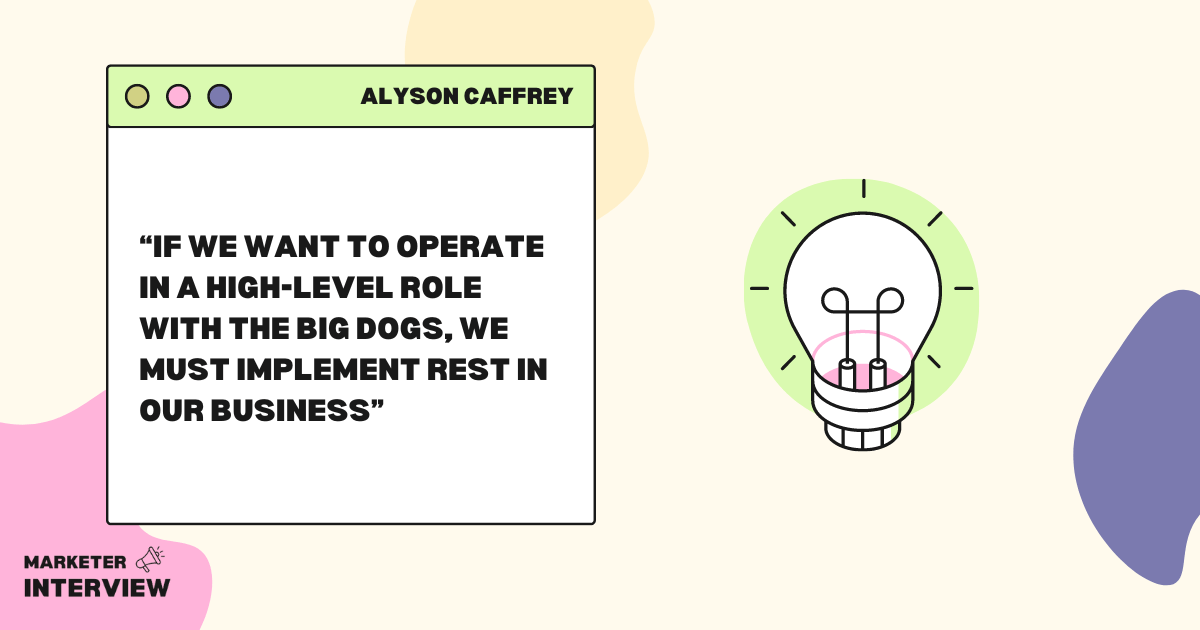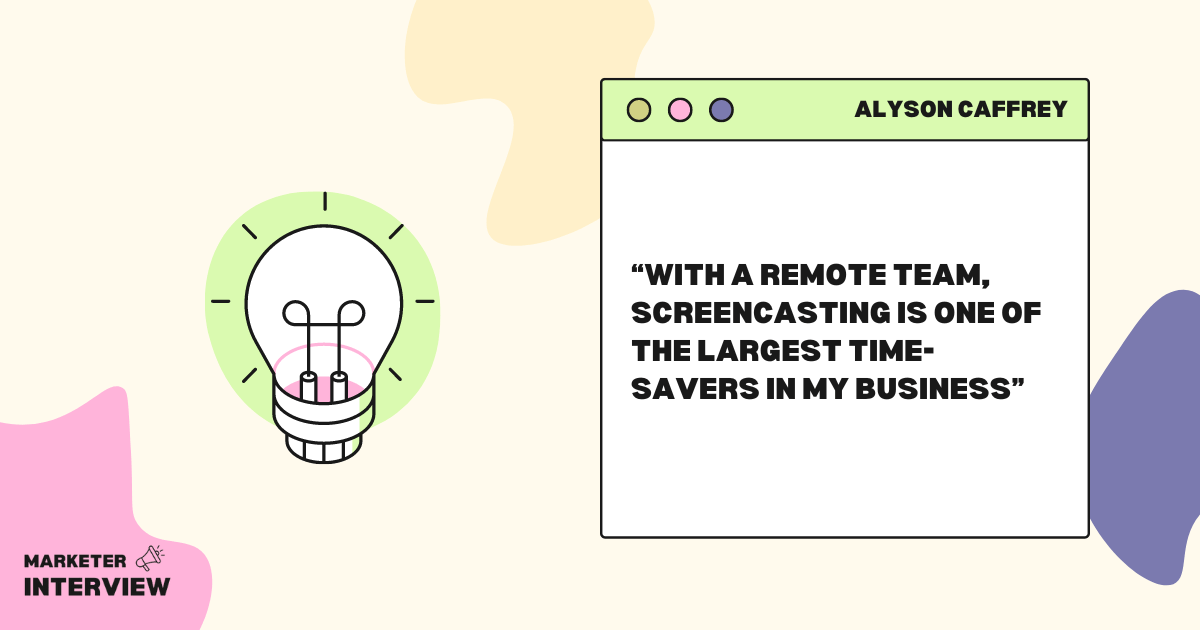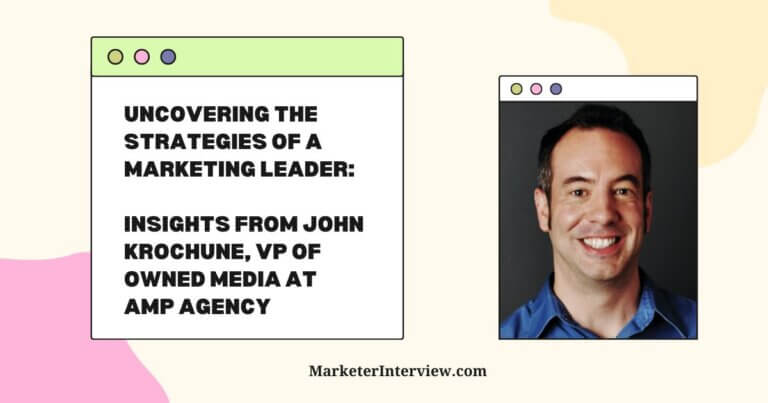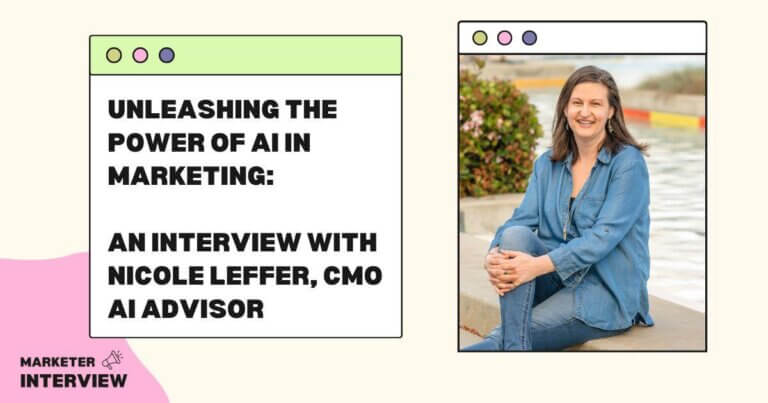Unleashing The Power of Operations: An Interview with Alyson Caffrey
Welcome to another insightful interview on Marketer Interview!
Today, we have the privilege of sitting down with Alyson Caffrey, a true force in operations and small business strategy.
With an impressive background as the Founder of Operations Agency and a bestselling author of “The Sabbatical Method,” Alyson is here to share her wisdom on creating efficient systems, building unstoppable teams, and achieving a work-life balance essential for success.
Let’s jump into the interview and uncover the insights that Alyson has to offer.
Contents
- 1 Can you tell us about your journey into marketing and operations? What inspired you to take this path?
- 2 Your book, “The Sabbatical Method,” has gained significant attention. Could you share some fundamental principles from it, especially related to professionalizing operations while taking time off?
- 3 As the Founder of Operations Agency, could you highlight a pivotal moment that shaped your approach to operations and team management?
- 4 “Creating unstoppable teams” is a bold statement. What strategies do you employ to foster high performance within small teams?
- 5 With your expertise in operations, could you outline a few actionable tips for our readers to enhance their business processes effectively?
- 6 Balancing motherhood and a successful career is no small feat. How do you manage your time and responsibilities to maintain this delicate equilibrium?
- 7 What role do you believe technology plays in optimizing operations for small businesses? Are there specific tools or software that you find particularly valuable?
- 8 Could you share a challenging project you’ve worked on where your Operations Simplified™ framework made a significant impact? What were the outcomes?
- 9 In a constantly evolving field, staying updated is crucial. How do you keep yourself informed about the latest trends and developments in operations and marketing?
- 10 What advice would you give aspiring marketers specializing in operations and systems management?
- 11 Looking ahead, what excites you the most about the future of operations in the business world? Are there any emerging trends that you find particularly intriguing?
Can you tell us about your journey into marketing and operations? What inspired you to take this path?
Thanks so much for having me!
I got started in operations about 8 years ago when I was working at a marketing and PR agency. We helped public speakers get on stage and monetize their audiences. While I was there, we launched coaching programs, 1 on 1 service, several live events, and workshops, and we had our hand in a little of everything. It was enjoyable and also exhausting!
About two and a half years into the role, I sat down with the founder and broke the news that my husband and I would be moving. He was in the military then, and we had an opportunity we couldn’t pass up.
The founder was devastated and asked me for a three-month transition period. At the time, all things flowed through me for better or worse. And that was a dangerous position for the business to be in. I granted his request and worked with the team to define the operations department, what core processes we had, what reports we used, how we set up our tech, and what performance indicators were expected of the team.
At the end of the transition, the founder thanked me emphatically, and within 30 days, I was packed with a book of business by other founders who wanted the same thing– structure. That’s how the Operations Agency was born.
I started like many agency owners, freelancing and working as a fractional COO behind the scenes of many growing companies, working on developing my core operational framework, which I now share with communities of owners looking to stabilize their core business operations at scale.
Of course. This is such a critical idea for me. And a lot of owners can relate.
Rest is hard to place an ROI on. We think more time equals more revenue, profit, and impact. And if you look at some of the most successful Fortune 500 CEOs, they will take strategic time away from the business to generate the most impactful ideas for the company’s direction.
Taking time off isn’t just strategic, either. If we want to build a business that we don’t resent, we need to create boundaries about how it operates so that it doesn’t creep into our personal lives, leading to lost relationships, health crises, or burnout.
My position is this: If we want to operate in a high-level role with the big dogs, we must implement rest in our business. We can’t place every decision, every task, on one person. It’s not sustainable. And it won’t scale.
I help owners use a sabbatical as a forcing function to professionalize their operations and get out of the day-to-day of their business.

As the Founder of Operations Agency, could you highlight a pivotal moment that shaped your approach to operations and team management?
Great question. I love my team. And I know so many owners who have fantastic teams supporting them.
A huge moment in the history of the Operations Agency was when I took my first maternity leave with my son Frank. I remember breaking the news to the team and our clients, terrified that everyone would abandon ship. And, guess what, they didn’t!
I had never taken more than a week off from the business to date, and we needed to strategize a plan to give our team at the time the autonomy to keep things moving while I was out. We used the first version of the Sabbatical Method to plan for my time away.
Not only did my team serve our clients at the time, but they were coming up with new strategies to help make things more streamlined, generate new business, and create case studies for us. I was blown away. I realized that I needed to get out of my team’s way and trust and empower them to be unstoppable.
“Creating unstoppable teams” is a bold statement. What strategies do you employ to foster high performance within small teams?
Trust. Wholeheartedly. If you create an operations function at your agency or small business, you can trust that your team can handle things.
First, you need to be clear about what you want. Cast that vision. Often, owners need to hear that their team isn’t performing “well” because they slack off and don’t follow through on their systems. They won’t use their project management tool, fill out their spreadsheets, and follow their processes. Cast the vision and lead by example.
Second, your team isn’t going to take over… overnight. Be OK with offloading 20-30 percent of a task before giving them a large chunk. So many people get burned by delegating because they create a process or list of tasks, wrap everything in a pretty bow, and are shocked when someone (on their first try) doesn’t nail in 100 percent.
We need to stop living in the fantasy that someone can do everything we do and have the industry expertise, clarity, and care we have in our business. Our team wants to help and bring something different to the table that we haven’t even considered… let them.
Third, don’t step over them. Many owners jump back in because they can “do it faster” or “do it better” than their team. Give your team members the time to fail and build those skills, and don’t undermine them by jumping in when things get challenging. It may make them think you don’t trust or believe in them.
With your expertise in operations, could you outline a few actionable tips for our readers to enhance their business processes effectively?
Here’s where I start to get geeky, so hang on!
1. We need to centralize and define:
Your processes are worth zip, zilch, and nada if no one can find them. How often have you searched the ethers of Google Drive for that “one document you made that once” or that “proposal that crushed it on that one project”? It’s so time-wasting, and we need to stop.
Create a spreadsheet, organize everything there, bookmark it in your central workspace, and pin it to your Slack channel so you’re only a few clicks away from anything you need to access.
Next, define what the heck goes in there! It sounds so essential, and it truly is. What is a Standard Operating Procedure, when do we use it, what does it look like? What templates do we have? What examples of past projects can we link? You want to be as transparent as possible about what is going into your playbook and who owns which element.
2. Become a screencasting PRO:
With a remote team, screencasting is one of the largest time-savers in my business. I work with clients to build this muscle as well.
Record your screen while you’re doing tasks that could otherwise be offloaded or need to be standardized, and make sure they make it into your central location for assets I mentioned earlier. That way, when someone has a question: “How do I {BLANK}?” they can jump in and check out a handful of videos on the subject.
Like a little savings account, we want to ensure that we deposit into our knowledge base consistently before we need it. Many agencies will start compiling training documents the night before their new hire begins. Don’t be that person!

Balancing motherhood and a successful career is no small feat. How do you manage your time and responsibilities to maintain this delicate equilibrium?
Sheesh! It’s a constant work in progress. As a busy mom, I am proud of how disciplined I am at reviewing what is going on at work and home and making sure I can reflect on my days and weeks. If I feel overwhelmed, I’ll look at what’s been happening in my day or week and consider: Is this a growing pain, or am I doing something I should not be doing?
I always remind myself that my family (my kids and husband) comes first. And I’m always finding new ways to identify throughputs in my business that support my life, not vice versa. I know a lot of parents that struggle here because they want to divide their time consistently and make sure that they are giving as much to their family as they are their business.
Over the last three years, I’ve learned that there will never be a balance. By definition, “balance” is only a moment in time. We parent-preneurs need to reconcile with the fact that there will be seasons of time when we’re working more in the business and seasons of time when we’re predominantly mom or dad. The thing to note most importantly is that we need to have systems in place to make sure one or the other doesn’t run away with our time unintentionally.
What role do you believe technology plays in optimizing operations for small businesses? Are there specific tools or software that you find particularly valuable?
Everyone I interview despises this answer, but it’s who I am, so that I will give it anyway. Tools do not matter.
Sure, it’s great to have a PM tool, but I know many agencies with basecamp or teamwork, and it hasn’t been correctly set up. The teams don’t use it consistently, and it becomes a gigantic thorn in the side and cumbersome to update.
We need to define our operations and audition pieces of tech to fit our needs. Use and abuse a spreadsheet first, put all your checklists in Google Docs, and use them before committing to the tech. It’ll help you accelerate so much faster. No tool will save your business unless you have the content and structure to make it work FOR you.
When I first started, I worked with a well-known media buyer. He was working primarily alongside his wife part-time and a handful of contractors. He’d seen tremendous growth and success in the marketplace, and his solutions got folks a return on investment like they’d never seen before.
But behind the scenes, things were hectic. He’d built a world-class brand and was pretending to be his assistant. It was stressful for him, and they had a young daughter at home. It dawned on me then that someone with a successful business, who gets incredible results can get stuck not mastering the basics of running a business.
I know many founders who need help with delegation, setting up basic systems, and defining project management rules. Sometimes, our success drives us right past some of the first critical checkpoints we must hit to build something sustainable.
This client, in particular, worked with me on a few things: the model, the systems, and the visibility. We created a new way of working and mentoring other media buyers and business owners who didn’t take up much of their time running the ads and were slack adjusters in the revenue department.
We created systems for how he fulfilled his core program and 1 on 1 service so that he could come up for air and delegate some of the administrative tasks. Then, we set up a central hub with key performance indicators for him to track. He was revitalized and no longer answering his support emails 🙂
In a constantly evolving field, staying updated is crucial. How do you keep yourself informed about the latest trends and developments in operations and marketing?
By jumping in. One of my favorite things to do is work with clients 1 on 1 and get my hands on their accounts.
Whether it’s a PM tool, documentation center, learning management system, you name it, I’ve been in. It’s not the most sexy solution, but has been the most effective.
What advice would you give aspiring marketers specializing in operations and systems management?
Start now. Before you think you’re ready. There’s never a perfect time to begin creating systems in your business; it’ll be the first thing to fall off your plate if you don’t prioritize it.
Think of creating systems and processes like depositing into a high-interest savings account. You don’t know when you’ll need to fall back on it, but it’s great to have it when it comes.
Even if you’re pre-hire or a team of one, start recording your screen and compiling standard operating procedures that your future team can leverage. It’ll save you time at a friction point in your growth… training new hires from scratch is a pain.
Looking ahead, what excites you the most about the future of operations in the business world? Are there any emerging trends that you find particularly intriguing?
AI is changing the way people operate and document things. It’ll take the routine and the mundane out of preparing systems and operations.
Once AI tools can build automation (they can already write custom webhooks), it’ll be much easier and faster to build the type of throughput businesses put off for too long.
I’m thrilled that these tools are becoming more advanced and accessible because they’ll help business owners stay in business longer and have more enjoyable, profitable businesses.






